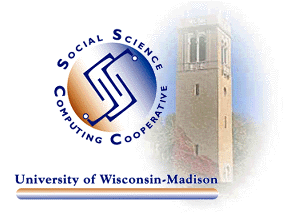
Using User Written Stata Programs on Winstats
ELAINE and MARIAH to be Retired
SSCC's Spring Training Schedule
Interested in Joining a SAS Users Group?
Tip: Protect Your Computer from Viruses to Cut Down on Spam
One of Stata's strengths is its large and active user community, and the large volume of code they have written and made available on the web. However in the past it has been awkward to use user-written programs (ado files) on the Winstat servers because Stata looked for them on the C: drive. We've found a way to change that.
Now when you start up Stata on a Winstat server, your PLUS directory (for ado files written by other users) and your PERSONAL directory (for ado files you have written) are automatically set to w:\ado\plus and w:\ado\personal. Note that findit or net install will create the the PLUS directory for you if it does not exist. This means it is now as easy and automatic to install user-written ado files on the Winstats as it has always been on Linux/UNIX or other PCs.
If you have put ado files in other locations, you can continue to use sysdir set to change these folders, or use the new ones. Unless you've installed a large number of ado files, reinstalling them using findit is probably the quickest and safest way to switch. Just type findit adofile where adofile is the name of the ado file you want to install.
If you have installed ado files on the C: drive, please recall that the C: drives of the terminal servers are not for use by users. They are not network drives, but the local drives of the terminal servers themselves. SSCC staff will feel free to delete files or even reformat the drive if needed to ensure smooth operation of the terminal servers. Please move or reinstall any such ado files to the W: drive as soon as possible.
Please note that none of this applies to those running Stata on Linux/UNIX or PCs other than the Winstats.
ELAINE and MARIAH, two of our oldest UNIX servers, will be retired at the end of this month. This is part of our plan to move to an all-Linux environment by the end of the year. FTP services formerly hosted by these servers will be taken over by our main FTP server, but the addresses will not change.
Keep in mind that KITE is much faster and has more memory than ELAINE and MARIAH combined. Look for announcements soon about new servers as well.
We have one training class left this semester: Formatting Your Dissertation in Word (Apr. 13, 10:00-11:30). Visit SSCC's training web pages for registration information. Remember that all SSCC training sessions require preregistration.
Jane Smith, a SAS programmer in IRP, is interested in starting a SAS Users Group that would meet regularly to share information. In addition, people could subscribe to a listserv for asking questions. E-mail Jane for more information: jsmith@ssc.wisc.edu.
Under pressure from consumer complaints, federal law, and now major lawsuits, spammers are finding it harder and harder to send spam from commercially available computers. So they'd like to use yours. Many of the latest generation of viruses will quietly install an email server on your computer which can be used to send spam without your knowledge. So if like most of us you're tired of the flood of spam coming into your inbox, make sure you're not contributing. Check that you have all the latest patches for Windows (visit windowsupdate.microsoft.com) and the latest virus definition files for Norton (click on the little yellow icon in the lower right corner of your screen and then click LiveUpdate) on your home PC, laptop, or any other PC that does not log in to PRIMO. PCs in the Social Science building that log in to the PRIMO domain are protected automatically.
Go to previous editions of
SSCC News.
Go to the SSCC Home Page.
© 2004 University of Wisconsin Social Science Computing Cooperative